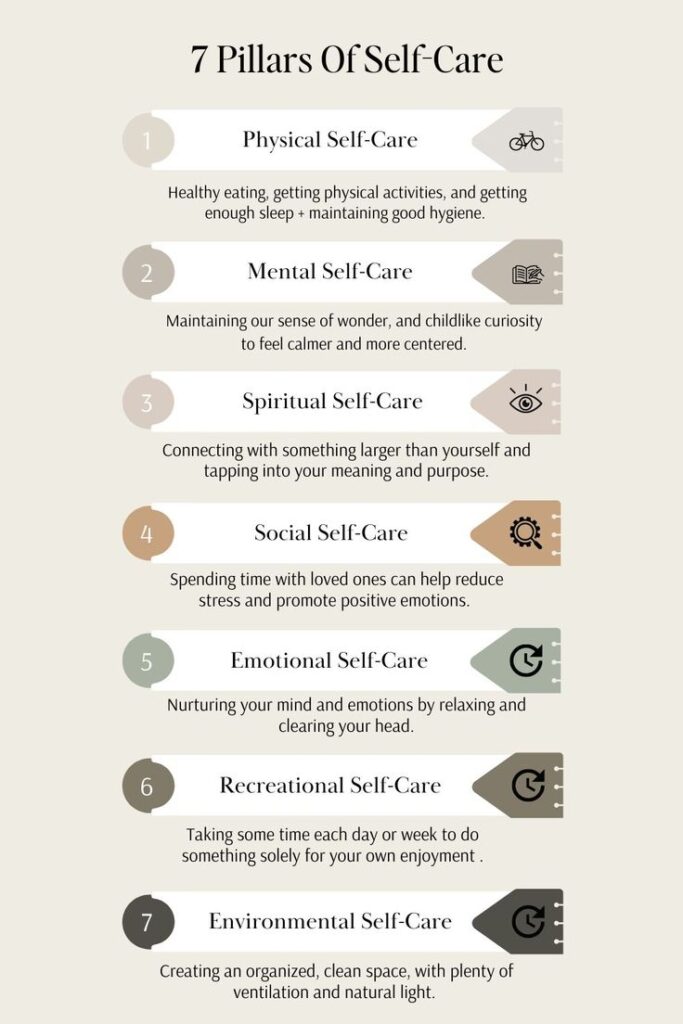Sometimes life moves faster than our breath can follow, a blur of to-dos, quiet longings, and that aching need for space to simply be.
In these moments, the invitation is simple: come home to yourself. These seven pillars of self-care aren’t trends or strict routines. They’re gentle foundations that help you live with more presence and intention. Whether you’re rediscovering what it means to rest or deepening rituals you already cherish, these pillars offer a gentle structure.
Here, we don’t strive for perfection. We simply return, again and again, to the small acts that keep us connected to our breath, our joy, and our quiet knowing.
Physical Self-Care: Tending to the Temple
Your body is your first and most loyal home. Physical self-care is not about rigid routines; it’s about moving in ways that feel good, resting deeply, eating in a way that truly nourishes you, and listening when your body asks for a pause. It’s choosing kindness toward yourself in the daily, simple ways.
Gentle question: How can you honor your body’s needs today?

Mental Self-Care: Creating Space for Clarity
A clear mind supports a steady heart. Mental self-care is about giving your mind space to breathe — through quiet moments, digital breaks, creative challenges, or small practices like journaling. It’s protecting your mental energy and choosing what you let in.
Gentle question: What helps your mind feel light and clear?
Emotional Self-Care: Holding Your Inner Weather
Emotional self-care means allowing your feelings to be seen and heard, without judgment. It’s talking to someone you trust, expressing yourself through art or writing, practicing self-compassion, and setting boundaries that keep you safe. This pillar is about learning to befriend your inner landscape.
Gentle question: What emotion needs your attention today?
Spiritual Self-Care: Connecting with Meaning
Spiritual self-care isn’t necessarily about religion — it’s about connecting to what gives your life meaning. Time in nature, moments of quiet reflection, gratitude practices, or acts of kindness can all nurture this connection. It’s about feeling rooted in something larger than yourself.
Gentle question: What makes you feel most connected to something beyond yourself?
Social Self-Care: Nurturing Your Circles
Relationships shape so much of how we feel. Social self-care is about spending time with those who uplift you, communicating honestly, and also honoring your need for solitude. It’s choosing quality over quantity and tending to your connections with presence and care.
Gentle question: Who makes you feel most like yourself?
Recreational Self-Care: Making Space for Joy
Play and leisure aren’t luxuries — they’re essential. Recreational self-care invites you to make time for hobbies, small adventures, or activities that make you laugh and feel alive. Joy refreshes your spirit in ways nothing else can.
Gentle question: What lights you up, just for the joy of it?
Environmental Self-Care: Shaping Your Space
The spaces we inhabit shape our inner world. Environmental self-care is about creating surroundings that feel supportive and calm — decluttering, adding plants, letting in natural light, or creating small corners that invite you to rest. A nurturing environment can be a quiet anchor.
Gentle question: What small change could make your space feel more like a sanctuary?
Self-care is not a destination; it’s a gentle, ongoing practice. By returning to these pillars, you’re not adding to your to-do list — you’re weaving moments of care into your every day. Start small. Start where you are. And remember, you’re allowed to take up space in your own life.
Pin for later:


Related posts:
Subtle Signs You’ve Been Disconnected from Your Feminine Energy
